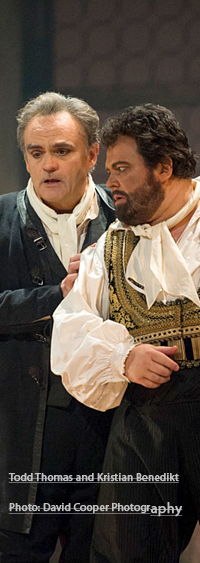
 |
 |
|
|||||||||||||||||||||||||||||||||
|
Dates and Venue October 15, 17 & 23 at 8pm, October 21 at 7.30pm & October 25 at 2.30pm | The Royal Theatre, Victoria Otello Kristian Benedikt Desdemona Leslie Ann Bradley Iago Todd Thomas Cassio Adam Luther Emilia Lynne McMurtry Montano Alexander Dobson Roderigo Matthew Bruce Lodovico Jeremy Bowes Conductor Timothy Vernon Director Glynis Leyshon Production Designer Peter Hartwell Lighting Designer Guy Simard Chorus Director Giuseppe Pietraroia Stage Manager Sarah Robb; with the Victoria Symphony and the Pacific Opera Chorus In Italian with English Surtitles Reviewer Elizabeth Paterson Otello opens with the roar of a storm at sea. Winds blow, thunder and lightning crack, huge breakers roll and crash both through the orchestra playing at full strength and projected on stage. It is a visceral experience and an expression of the forces at work in the opera. Set on Cyprus during the glory days of the Venetian Empire, Verdi’s opera follows Shakespeare’s scenario very closely. Eliminating the social background explored in the play, Verdi amd Boito concentrated the deeply passionate responses of both Otello and Desdemona to Iago's accusation of adultery. He accentuates Iago’s intense hatred of Otello which causes him to fabricate such a suggestion and stir up Otello to madness. The orchestral storm is joined by a full chorus of Cypriots and the tension further tightens as the ship they catch sight of is recognized as Otello’s with news whether he has won or lost against their enemy. Verdi allows a brief moment of relief as the ship docks safely and then Otello strides on stage and the power level surges again. Kristian Benedikt has a tenor voice as dark and strong as his stage presence. Authority and command ooze from him as he announces on a ringing high C# “Esultate” (Rejoice). He has won the victory and his ally the storm has scattered the enemy. Benedikt knows also how to be tender. The wonderful duet “Già nella notte densa“ which explores in retrospect the time of courtship between Otello and Desdemona was rich and luminous and moved forward to the present with the delicate intensity of kisses against a starry sky. In complete sympathy with Desdemona, he found abundant variation and nuance to express a rich and genuine love. Benedikt also showed himself to be a fine and intelligent actor in his progress from confident commander filling the stage to a small, broken, heap of emptiness, completely at the command of Iago, and finally to a man possessed. Leslie Ann Bradley’s Desdemona was a splendid match. As strikingly fair as Otello is dark (no black-face here, but an abundance of dark, curly hair and beard), dressed mostly in white, this Desdemona is made of heroic material, and not the wimpy 19th-century heroine of popular imagination. Blessed with a gorgeous voice and impressive acting ability Bradley’s Desdemona was a woman who made her own decisions. Her profound expression of love and partnership with Benedikt in the kiss duet gave his suspicions against her the greater horror. her lyricism and latent dread in “La canzon del salice” (“The Willow Song”) gave her tragedy the greater pathos. Matching these two in vocal technique and dramatic skill, Todd Thomas’s Iago was a plausible, secret, spine-chilling villain. The “Credo”, in which Iago lays out his being, innately vile, born wicked, was a bleak and desolate statement and a mockery of goodness, as subtle in phrasing and colour as in understated acting. The Pacific Opera Chorus and the rest of the cast were all fine singers and good actors but without the heft of the principals. The orchestra, beautifully balanced under the baton of the inimitable Timothy Vernon, played out without reservation for the storm, softened to delicate accompaniment in “Già nella notte densa,“ and constantly maintained the tension which lurks in every scene. Glynis Leyshon’s spare and comprehensively intelligent stagecraft, of a piece with the musical direction, was beautifully supplemented by an abstract set coloured with rich Renaissance reds and a deep, emotive sea-rich aquamarine, courtesy of Peter Hartwell and Guy Simard. © 2015 Elizabeth Paterson |
||||||||||||||||||||||||||||||||||